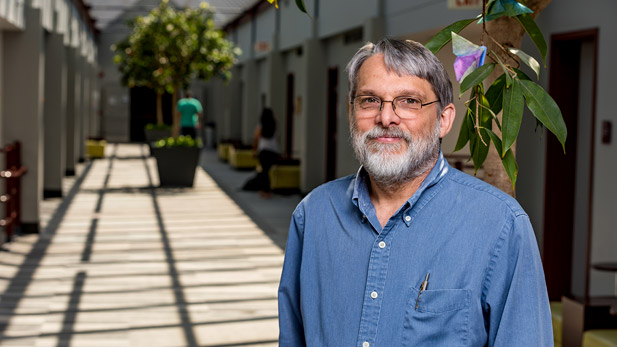Bunch Sheds Light on Optics Education

Robert Bunch has grown professionally as the optical engineering field matured as a career field. He developed and taught most of the optics courses within Rose-Hulman’s academic catalog.
Although he’s too humble to admit it, Robert Bunch’s contributions to Rose-Hulman’s physics and optical engineering program can’t be measured by any of the light-based technologies in his laboratories.
After all, he taught the first classes on campus in fiber optics and laser physics, and developed or taught nearly every optical engineering course currently in the program’s course catalog.
He’s taught every applied optics/optical engineering major since the academic area was introduced shortly after Bunch joined the faculty in 1983.
Bunch also helped lead Rose-Hulman’s involvement in a National Science Foundation-sponsored Smart Lighting initiative that introduced important innovations from the laboratory bench to classrooms across the country.
And, he was actively involved in the startup of the Center for Applied Optics Studies, which laid the foundation for the institute’s successful Rose-Hulman Ventures operations. Each program has provided pathways for students to learn valuable work experiences on real-world projects with outside clients. (Bunch is listed on two patents for his project contributions.)
“When I arrived there were no personal computers. I was actually high-tech, using my personal Apple II to write up exams and print those out on a dot-matrix printer to get them mimeographed,” recalls Bunch, ending his 37-year faculty tenure with retirement at the end of the school year. “To an optics person, overhead projectors are actually amazing technology, but this is about all we had in the classrooms, other than chalk. We’ve come a LONG way.”
And, Bunch has evolved as well. His favorite class, covering photonic devices and systems, still bridges the gap between physical theory and practical applications in engineering.
“It began under the name ‘optical instrumentation’ during the 1980s and was designed to answer the questions for students about specifications that must be met by instruments and how they are determined,” he recalls. “When we moved to offer the optical engineering degree, the course was renamed ‘optical systems’ to introduce students early in their education about a systems approach to understanding optical systems. The focus was still on how these devices are incorporated into the design of systems and instruments. Then, about eight years ago, the course became more focused on specific systems of photonic devices and to use a more modern terminology from the industry for this area.”
Bunch has supplemented his classroom teaching with a variety of industry experiences and a broad research background. He has assisted in the development of optics-based products, optical instrument design, and fiber optic components, systems, and sensors. His expertise also covers light scattering and solid-state physics. One of his recent research opportunities with students investigated the optical properties of LEDs for lighting applications. Those efforts helped him earn the Board of Trustees’ Outstanding Scholar award in 2000.
“Getting to know and work with talented students and to watch them become successful professionals should be the satisfaction of all educators,” he says. “My early department faculty mentors were Bill Meeks and Paul Mason. They showed a young colleague what teaching was all about. Learning from them and working with them was special. Hopefully, I have passed along those lessons onto others as well.”
Bunch estimates that he has mentored 30 completed master’s thesis projects, with his final graduate-level student graduating this year.
“Rose-Hulman gave me the freedom to pursue ideas about better teaching, to work with talented students on industry projects, and develop new educational programs. I never felt like I had a boss telling me what to do,” he adds. “(former Rose-Hulman president Sam Hulbert’s mantra was ‘the only reason that Rose-Hulman exists is for our students.’ I fully bought into this philosophy. I hope that remains a guide in everything we do as an institution.”